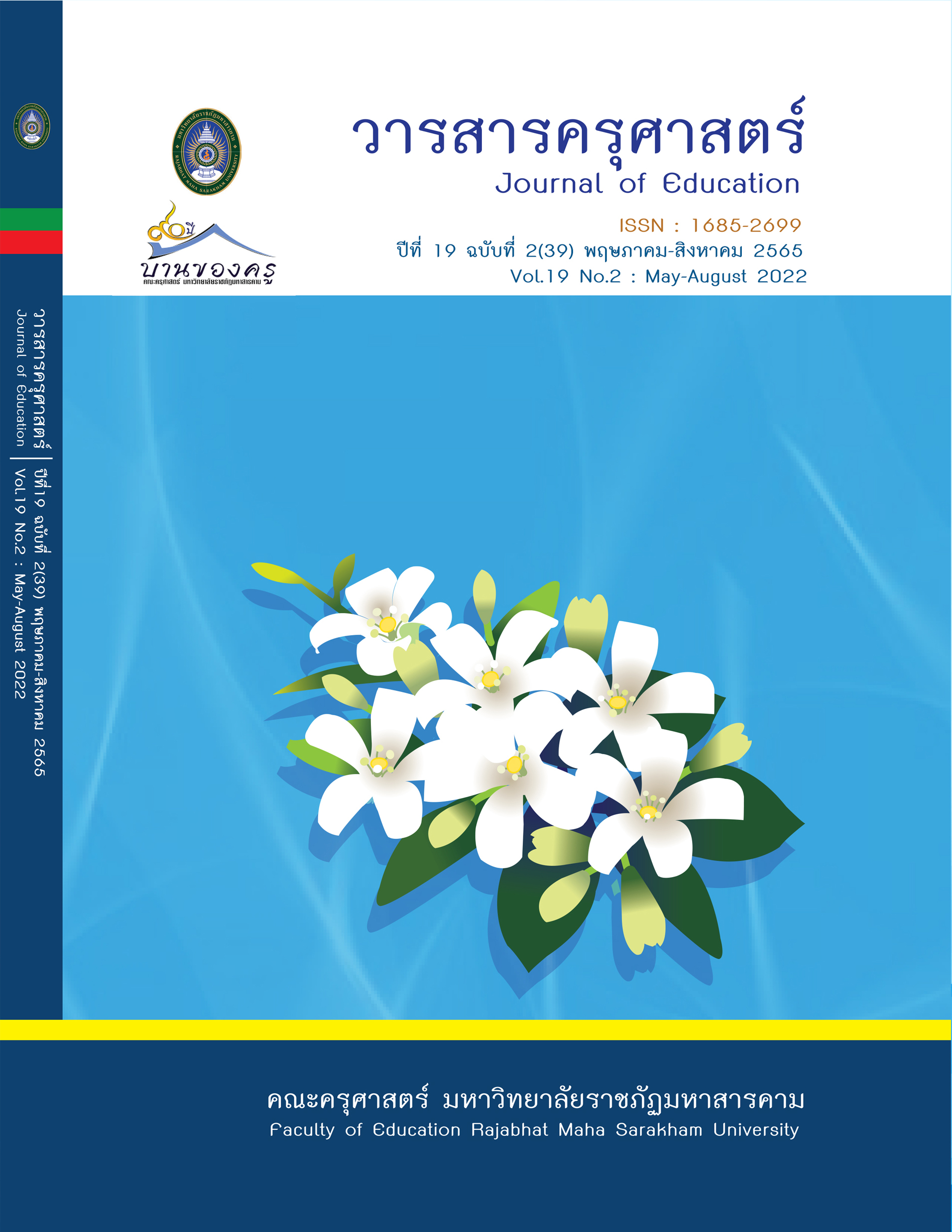The Development of Online Training Model of Drones for Basic Agriculture
Main Article Content
Abstract
This research aimed to 1) develop online training model of drones for basic agricultural with good quality level, 2) compare pre- and post-learning achievement score of online training, 3) investigate the satisfaction towards to the Web-Based online training and 4) explore the troubles and obstacles of the online training. The data were collected from 25 agricultural drone trainees of NADrone Project chartered by Easy 2018 company limited in 2022. The research instruments consisted of 1) "Web-Based” online training model, 2) pre-test and post-test of the online training, 3) satisfaction questionnaire on the "Web-Based” online training. The data analysis statistics were percentage, mean, standard deviation and paired sample t-test.
This research results showed that 1) the quality of the online training model was at excellence level (=4.61, S.D.=0.28), 2) the comparison of pre -test and post- test mean score found that the achievement scores after the training was higher than before the training at 0.05 level of significance, 3) the trainees expressed satisfaction with the online training at high level ( =4.09, S.D.=0.69) and 4) the troubles and obstacles of the online training were some of topics are too long and cause reduce learners’ interests. Also, the learners haven’t got used to this new training and they have low internet signal that cause the figures quality.
Article Details

This work is licensed under a Creative Commons Attribution-NonCommercial-NoDerivatives 4.0 International License.
ข้อกำหนดเบื้องต้นที่ผู้นิพนธ์(ผู้ส่งบทความ) ควรทราบ
1. ผู้นิพนธ์ที่ประสงค์จะลงตีพิมพ์บทความกับวารสาร ตั้งแต่เดือนมกราคม 2563 เป็นต้นไป ให้ใช้รูปแบบใหม่ (Template 2563) โดยสามารถดูตัวอย่างได้ที่เมนู GUIDELINES
2. จะตีพิมพ์และเผยแพร่ได้ ต้องผ่านการประเมินจากผู้ทรงคุณวุฒิ (Peer Review)
3. การประเมินบทความโดยผู้ทรงคุณวุฒิ (Peer Review) เป็นแบบ Double Blind
4. การอ้างอิงบทความใช้หลักเกณฑ์ APA (American Psychological Association) คลิก
5. บทความถูกปฏิเสธการตีพิมพ์ ไม่ผ่านการประเมิน ผู้นิพนธ์ขอยกเลิกเองหรือชำระเงินก่อนได้รับการอนุมัติ ทางวารสารไม่มีนโยบายการคืนเงิน
References
เจิดจันทร์ พลดงนอก. (2556). การพัฒนาระบบการฝึกอบรมออนไลน์แบบสอนงาน สำหรับเจ้าหน้าที่ผู้ให้บริการผู้ใช้
เทคโนโลยี ธนาคารพาณิชย์. วารสารวิจัยมหาวิทยาลัยศิลปากร, (6), 385-398.
ชูชัย สมิทธิไกร. (2550). การฝึกอบรมบุคลากรในองค์การ (พิมพ์ครั้งที่ 8). สำนักพิมพ์แห่งจุฬาลงกรณ์มหาวิทยาลัย.
ธงชัย วจะสุวรรณ และ เจษฎา วงศ์แสนสุขเจริญ. (2565). การยอมรับเทคโนโลยีและนวัตกรรมที่ส่งผลต่อความตั้งใจใช้โดรนเพื่อการเกษตรในอุตสาหกรรมเกษตร. วารสารปัญญาภิวัฒน์, 14(1), 143-157.
ธนพงษ์ ไชยลาโภ และคณะ. (2559). การพัฒนาสื่อบทเรียนออนไลน์ เรื่องการออกแบบเพื่อการผลิตสื่อปฏิสัมพันธ์
และมัลติมีเดีย. วารสารวิชาการนวัตกรรมสื่อสารสังคม, 4(2), 134-143.
นิตยา มั่นศักดิ์. (2560). การพัฒนาบทเรียนบนเครือข่ายอินเตอร์เน็ต เรื่องการสร้างและตกแต่งคอมพิวเตอร์กราฟฟิก
สำหรับนักเรียนชั้นประถมศึกษาปีที่ 6. การศึกษาค้นคว้าด้วยตนเอง ศึกษาศาสตรมหาบัณฑิต สาขาวิชาเทคโนโลยีและสื่อสารการศึกษา. มหาวิทยาลัยนเรศวร.
บุญชม ศรีสะอาด. (2553). การวิจัยเบื้องต้น (พิมพ์ครั้งที่ 8). สุวีริยาสาส์น.
พงศ์ศักดิ์ บัวจะมะ. (2555). การพัฒนาวีดิทัศน์บนอินเทอร์เน็ตเพื่อส่งเสริมความมีจิตสาธารณะของนักศึกษาระดับ ปริญญาตรี สาขาวิชาเทคโนโลยีและสื่อสารการศึกษา มหาวิทยาลัยเทคโนโลยีราชมงคลธัญบุรี.[วิทยานิพนธ์ปริญญาศึกษาศาสตร์มหาบัณฑิต ไม่ได้ตีพิมพ์]. มหาวิทยาลัยเทคโนโลยีราชมงคลธัญบุรี.
สมัคร อยู่ลอง. (2556). การพัฒนาวีดิทัศน์เพื่อการเรียนรู้ด้วยตนเอง เรื่อง การเป็นผู้ดำเนินรายการและวิทยากรรายการโทรทัศน์เพื่อการศึกษาทางไกลผ่านดาวเทียม [สารนิพนธ์ ปริญญาการศึกษามหาบัณฑิต สาขาวิชาเทคโนโลยีการศึกษา]. มหาวิทยาลัยศรีนครินทรวิโรฒ.
สายใจ คุณบัวลา. (2558). ผลสัมฤทธิ์ทางการเรียนคอมพิวเตอร์แอนนิเมชั่นเบื้องต้น และความสามารถในการใช้
เทคโนโลยีของนักเรียนมัธยมศึกษาปีที่ 3 ที่สอนโดยใช้ทฤษฎีการสร้างความรู้ด้วยตนเองโดยการ
สร้างสรรค์ชิ้นงาน. วารสารจันทร์เกษมสาร, 21(40), 99-108.
อดิศร พึ่งศรี. (2561). การพัฒนาบทเรียนวีดิทัศน์ออนไลน์ วิชาถ่ายภาพ เรื่อง Advance Flash Photography.
การศึกษาค้นคว้าด้วยตนเอง ปริญญาการศึกษามหาบัณฑิต สาขาวิชาเทคโนโลยีและสื่อสารการศึกษา,
มหาวิทยาลัยนเรศวร.
Dinmore, S. (2019). Beyond lecture capture: Creating digital video content for online learning - a case study. Journal of University Teaching and Learning Practice, 16(1), 98–108.
Hariadi, B., Sunarto, M. J. D., & Sudarmaningtyas, P. (2016). Development of Web-Based Learning Application for Generation Z. International Journal of Evaluation and Research in Education (IJERE), 5(1), 60-68.
Nordin, A. B. (2013). Web-Based Teaching and Learning Approach (WBTLA) Usability in Institutions of Higher Learning in Malaysia. The Malaysian online Journal of Education and Technology, 1(2), 44-55.
Rovinelli, R.J. and Hambleton, R.K. (1977). On the Use of Content Specialists in the Assessment of Criterion-Referenced Test Item Validity. Tijdschrift Voor Onderwijs Research, 2, 49-60.


